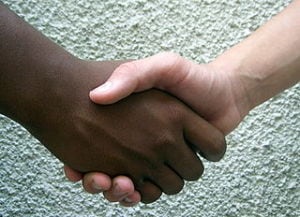
Study participants who scored very low on bias awareness reacted defensively to negative feedback and were unwilling to change their behavior. (Photo: Creative Commons)
While most white Americans have let go of the notion that we are now living in a post-racial society, many are proud to claim that they are supposedly “colorblind” and see no difference between blacks and whites, or other races.
A new study from the University of Vermont reports that white Americans who are aware of their personal racial bias are far more likely to attempt to address racial challenges, especially in situations where racism is expressed in subtle or seemingly unintentional ways.
“Our society is filled with negative stereotypes associated with blacks, and whites’ attitudes and behaviors can’t help but be affected, although often in ways they’re not clearly aware of,” said Sylvia Perry, assistant professor in the Department of Psychological Science at the University of Vermont and the lead author of the study in a university interview. The first step towards reducing these subtle biases is personal awareness and internalizing the fact that you may have subtle biases.”
A New Way of Looking at Racism
To gain a better understanding of the role of “bias awareness,” a trait never before defined and researched, Perry and her team gave a range of psychological tests to 902 white Americans.
The tests were designed to assess racial attitudes, as well as bias awareness.
To assess bias awareness, study subjects were asked to score their responses to a series of statements such as: “When talking to black people, I sometimes worry that I am unintentionally acting in a prejudiced way.”
Test subjects who scored high in bias awareness were more able to accept and internalize negative feedback about their racial attitudes, telling researchers they felt badly when they were told that their test revealed that they had a strong preference for whites over blacks. The researchers also invented several positive steps the test subjects could take to correct their bias, including volunteering in greater numbers for a diversity initiative.
Study participants who scored very low on bias awareness reacted defensively to negative feedback and were unwilling to change their behavior.
The key factor in developing what the researchers called a “concerned awareness” of racial bias is acceptance, Perry said. “If you accept these things in yourself, you’re on the road to making things better.”
Even when people have high bias awareness, it’s important that they not avoid contact with people of other races that they may find uncomfortable, explained Perry, behavior called aversive racism.
Anti-Bias Training May Not be Effective
Perry’s team also questioned the effectiveness of one-size-fits all anti-bias training or diversity training, as it’s often called in corporate settings. They suggest that training should first measure and take into account an individuals’ levels of bias awareness, alone or in combination with the degree of their prejudice and motivation to reduce prejudice, will result in more effective and targeted anti-bias interventions and programs, the study states.
“Not everyone can be confronted with feedback about their bias and then just walk away and do better,” Perry advised. “Some people might need to talk it through and see what it means personally for them. Otherwise there could be backlash.”








